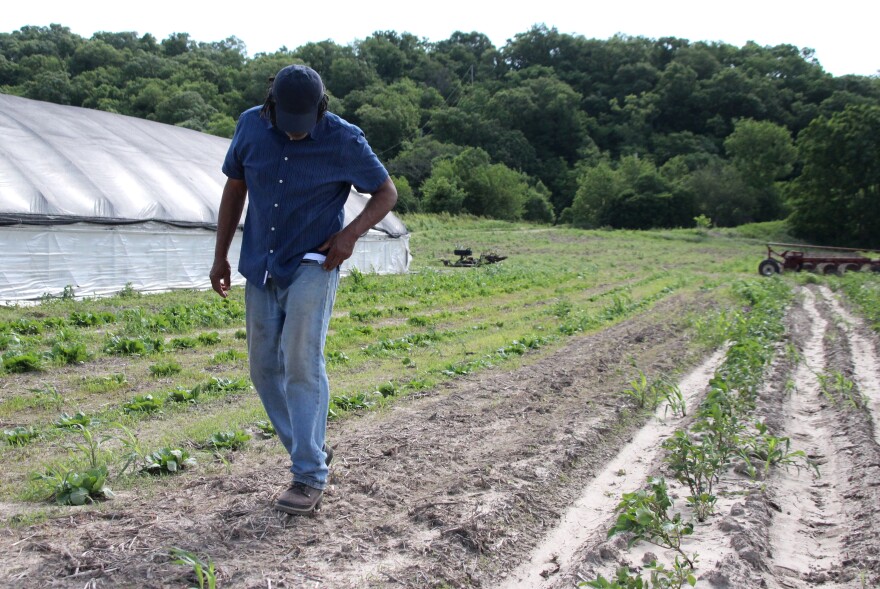Tomatoes and lettuce line the fields at Mike Pearl’s farm on a windy day in Parkville, Missouri. Now he has plans to plant even more.
“We're gonna have a lot of the usual suspects, if you will: the watermelon, cantaloupe later this season. You know, tomatoes, cucumbers, radishes,” Pearl said.
Despite the wind, he said, this year's crops are off to a good start, and they’re for some very special customers: local students. Pearl said he’s excited about these customers since he never grew up eating produce like this for lunch.
“I’m not gonna tell you how old I am, but I can't imagine in my school cafeteria eating quinoa, or, I don't know, fresh kale greens,” Pearl said.
This is Pearl’s first year working with the KC Food Hub to provide produce to local students. And this year's going to be a busy one.
This fall, the food hub will be serving 38 schools across two local school districts. Katie Nixon, the food hub’s president, said that’s a jump from the six schools they started with last fall.
She credits that increase, in part, to the pandemic — when suppliers suddenly couldn’t get schools the food they needed.
“So that's like, ‘Oh my gosh, what am I going to do?’ And then they start thinking outside the box,” Nixon said.

The Lee’s Summit School District started talking to the food hub in 2019, but when the pandemic hit and schools began serving kids at home, they had to adjust their plans.
Lori Danella, the district’s nutrition director, said when there was a shortage of food to send home, like baby carrots and sliced apples, she knew she could turn to the food hub for help.
“We know the farmers here. We know what the weather is, and they’re local. Their heart and soul is in this; this is their livelihood,” Danella said. “They're going to make sure their crops are okay, and everything gets done and the product gets to the hub, so then it can be sent out to the schools.
This fall, Lee’s Summit will serve 26 of its schools with produce from local farmers.
But not every district can do that. Budgets are tight, and produce from local farms can be more expensive.
Danella said the fresh produce works into their budget because there’s less waste and it has a better shelf life.
“The lettuce is just phenomenal. I mean, it is beautiful, and it lasts forever. Whereas when you get prepackaged lettuce, a lot of times you might get two or three days out of it,” Danella said.
The De Soto School District will also be buying produce from the KC Food Hub this fall, but only on Fridays.
Jolyn Baldner, the district’s director of student nutrition, said buying once a week will help them get comfortable buying locally, even with higher prices and labor shortages that limit what she can buy.
“I’d love to have a lot of watermelon and cantaloupe. However, that requires a lot of chopping, and when you have our biggest school, we're serving about 1,000 kids, or 1,000 meals,” Baldner said. “That's a lot of watermelon to chop if we don't have the labor and staff and manpower to do that.”

Baldner said it can also be difficult to locate farmers who can secure enough product for school districts.
While interest in these programs has increased slowly over the years, barriers like cost, labor and awareness are fairly common, said Jo Britt-Rankin, a professor with the MU Extension’s Farm to School program.
She said farm to school programs want to hear these kinds of questions at a series of listening sessions held through July with the Missouri Department of Agriculture. If they know what issues are out there, they can help fix them.
“Do they have the equipment? Although this can be easily addressed, are their staff trained in doing more food preparation and cooking than maybe they have in the last few years?” Britt-Rankin said.
The USDA has announced $60 million in farm-to-school commodity purchasing. Britt-Rankin said grants like these can help school districts participate despite tight budgets.
Nixon, KC Food Hub’s president, said local farms are only a part of the solution to supply chain problems facing schools.
The De Soto and Lee's Summit districts say they can't rely fully on local farmers because they'll need a backup source of food for their thousands of students if something were to happen, like a flood or fire.
But the challenges go beyond just school districts — local farms need extra support, too.
Nixon said producers need to know ahead of time what school districts will be ordering so they can plant it.
“That takes time, they need to grow the product and get used to that and help build up a local food system. But the demand is there, and I'm really excited about that,” Nixon said.

Both school districts partnering with the food hub are looking forward to the opportunity to teach kids about local growers.
The De Soto School District will be holding “Farm-to-Fork Fridays” to highlight which farm grew a specific product. Baldner said she hopes this helps students realize where their food comes from.
"I feel like that's something that can be lacking in education is understanding where and how we get our foods,” Baldner said.
Back at his Parkville farm, Pearl said that, despite the increase in demand, he’s not planning on getting rich off selling to schools this fall. He said it’s about the feeling he gets from doing it.
“We're helping educate the kids. We're helping, hopefully, a lifelong practice of eating nutritiously, eating for your health, eating and trying things that you've never tried before,” Pearl said. “It's a warm and fuzzy that I get out of it.”






